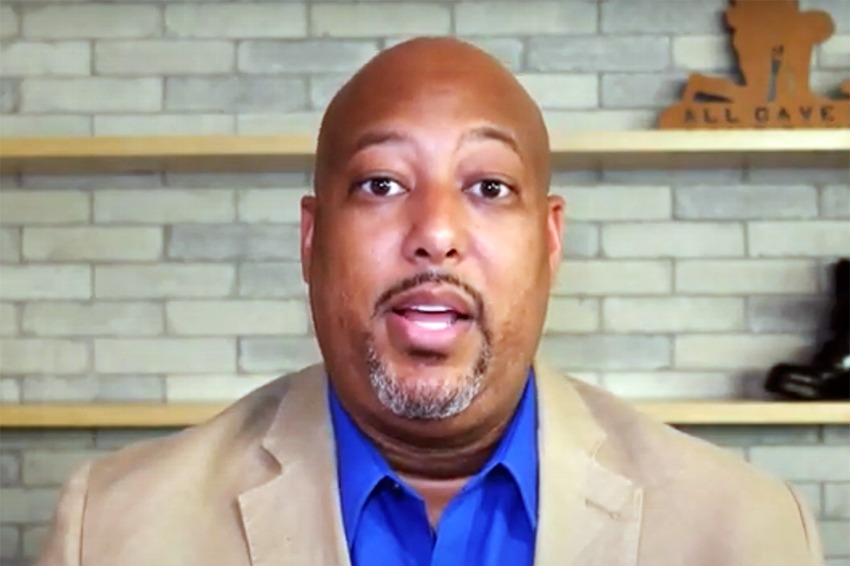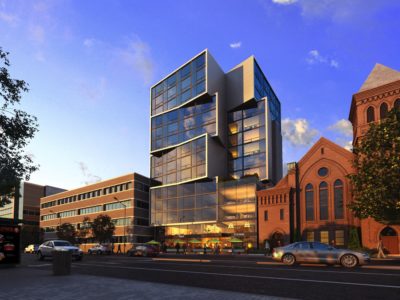Thomas L. Jacobs II understands the challenges veterans face when they exit the service.
“If you are from a military background, you had a unit of comrades and it was life and death,” he said. “Some people are missing that camaraderie…We’ve got to provide that network on the civilian side as well.”
Jacobs is working to build that network for veterans who are experiencing homelessness, through his role at Veterans Bridge Home. The former Army National Guard Guardsman helps connect veterans with local housing resources, providers, and networks in his hometown of Charlotte, North Carolina.
Charlotte is one of the 89 communities working to end homelessness as part of Built for Zero. In the last two years, they’ve reduced veteran homelessness by more than 20%, through the dedicated work of people like Jacobs.
“We want to share what we’re doing, so veterans across the nation, not just here in Charlotte, can thrive.”
A conduit of connection
“When someone’s homeless, they’re not hopeless. They’re just not in a home right now,” Jacobs said.
And that’s a problem he can help solve. Unlike some other agencies or providers that may greet a struggling veteran with a pile of paperwork to complete, Jacobs and the Veterans Bridge Home team prefer to have an initial conversation with the veteran.
“We ask them, ‘What do you need right now? What do you need in the future, so we can build a whole plan for you to get you connected?’”
Acting as a conduit of connection, Jacobs doesn’t provide direct service but rather ensures veterans are connected to the right people at the right time.
“The biggest thing is making sure we are connecting vets with the right agencies so we can have the best chance for success.“
Not only do their efforts get the veteran off of the street, but they also try to give them a head start by supplying them with “Welcome Home Kits” upon move-in, which are assembled by the Lake Norman Elks’ Lodge and include $300 worth of household items.
“We know that most vets aren’t looking for a handout, they’re just looking for a hand up,” he said.
Spinning wheels in the same direction
Jacobs and the team in Charlotte use a tool called case conferencing to problem solve for clients. It’s a regular meeting where homeless service providers and agencies discuss and seek housing solutions for people experiencing homelessness.
“We’ve been able to get the right people at the table,” Jacobs said.
A successful case conferencing meeting unites key players across the community as they coordinate resources and remove barriers to help house their clients faster.
“It’s working in harmony to move in so many different directions, but we’re moving in so many different directions together,” Jacobs explained. “It’s perfect chaos.”
Jacobs has been particularly proud to see the buy-in across more than 70 different organizations across Charlotte, especially the VA.
“I can pick up the phone and call 10-15 social workers at any given time,” he stated. “The relationship there is critical because we can do everything on the community side, but if veterans don’t tap into benefits they’re eligible for, you’re both spinning wheels in different directions.”
Charlotte builds to zero
Jacobs is a member of the Charlotte/Mecklenburg County Built for Zero team, a multi-agency group from providers across the city working to functionally end veteran homelessness and achieve the endpoint called functional zero.
“Built for Zero is an initiative to help get veteran homelessness down to ‘zero,’’’ he explained. “We may not get to the number zero, but we will get to the point that if we have 10 veterans who are homeless, we have services to accommodate all 10 veterans. That’s why we call it ‘functional zero.’”
In the last two years, Charlotte has made significant progress towards reaching their goals, reducing veteran homelessness by more than 20% since joining Built for Zero’s Large City Cohort, a group of populous cities committed to reaching ambitious goals to reduce homelessness.
“All the large cities that we work with are an inspiration, because their numbers are dropping,” he said. “Once we get to functional zero, we want to motivate other communities to let them know it’s possible.”
Built for Zero is not just a collection of communities: it’s a national initiative aimed to demonstrate that homelessness is solvable in a variety of contexts, seeding new expectations for what is possible and enabling conditions for all communities to reduce and end homelessness.
“We want to eradicate the problem of homelessness as a whole, so it doesn’t go bouncing from community to community,” said Jacobs. “We all work together to make sure we’re striving for the same goal.”




